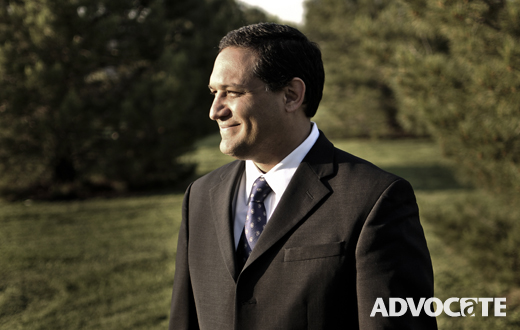During his tenure, Dallas ISD District 1 trustee Edwin Flores made tough decisions and endured scathing criticism for his policies to reform the school district. He will not seek re-election, welcoming a fresh set of eyes to the school board this May. Before leaving his post, Flores reflects on the progress and pitfalls of the last seven years.
Why did you decide not to run for re-election?
I served for seven years. I thought it was time to spend more time with my family. My kids are teenagers now, and the older the kids, the bigger the problems. I want to be more involved in their schools. My oldest will be going to college in three years, my youngest in six years. Once you get too entrenched [on the school board], it’s hard to stay focused on why you ran in the first place. There is very little room for compromise, so you lose your effectiveness. You’re darned if you do and darned if you don’t. I have pushed very hard for what is best for the kids. There are two types of people — those who want to help educate kids and help schools get better, and there are those who are in it for other adults. I’m in it for the kids.
What do the board members actually do? Are there misconceptions about that?
We’re a policy board, not an operating board. We don’t micromanage anything. We’re not mini-superintendents. You can’t write a policy for common sense. You have stupid people doing stupid things every day. It happens with every major employer in town — American Airlines, City of Dallas … you don’t hear about the 19,999 employees who are doing everything right.
How did the district get into its financial mess, and why didn’t anyone see it coming?
I have gone back and scoured every piece of information we were given. There is absolutely no way we could have foreseen this. Our problems were many, and they were longstanding — decades longstanding. Different systems didn’t speak to each other. We received estimates, not actual numbers. It had always been that way. There’s a misconception that somehow everything was great before. The data doesn’t back that up at all. Our student dropout rate was way worse than where we are today. Folks don’t realize how much we’ve already done.
So, what strides did we make during your tenure?
If you take a 30,000-foot view and look at the arc of events of what happened … So, Michael Hinojosa gets brought in to turn the system around. He does what any intelligent administrator does. He hires NCEA — the National Center for Educational Achievement — to come in and audit us. They say, these are the 17 things you need to fix — things that high performing districts do, and you do not. [One of those things was] silos. Every system was divided into areas. There was no central control for what was going on. We also had problems with the timing of when curriculum was being taught at schools within the district. The most shocking part was when they asked the teachers what the curriculum was, they’d say it’s “Everyday Math.” That’s a textbook, not a curriculum. So, we created curriculum-planning guides for the first time ever in the state of Texas. We penned this. What we know about high-performing districts is that they manage their instruction. Every teacher is teaching about the same thing across the district. Thirty percent of kids move schools every year. They’re six weeks ahead and bored to tears or six weeks behind and struggling. We enriched the state-mandated curriculum. We added more rigor to it. This is huge what we’re doing. But, it was inconvenient for the adults. We were interfering with their teacherness. We’re not telling them what to teach, we’re just telling them when to teach it. Once they saw the results, the resistance began to evaporate. Next, we had to fully integrate the bilingual program. We had 1,200 classrooms — not kids, classrooms — that didn’t have the state-mandated bilingual education. It took us three years to fill that, going out and finding the best teachers from all over the world. We have the opportunity to create the workforce of the future. Look at TJ [Thomas Jefferson High School]. Being bilingual wasn’t enough. They’re going tri-lingual. Principal Edward Conger has a third of his students learning Mandarin. We have the only English-to-Spanish dual language schools in Dallas — the private schools aren’t doing it. District 1 has eight [dual language schools].
So, what’s the problem?
The adults. We know what’s best for the kids. Nobody says this has to be mandated. Although, we get cash. For every bilingual student, we get 10 percent revenue. But all anyone cares about is whether Carla Ranger likes us or not. I’m a little bitter about the media. But let’s back up. To give you some context, at my first meeting on the board, DISD gets a national award for financial reporting. Things are looking good. The first year, our audit was three pages long. The second year, it was four pages long. Soon, it was 120 pages of things that needed to be fixed. So, we created an audit committee, which I was on, to go over the list. The next year, we added 15 more things. Four years later, things are looking OK. So, that’s the context. We get monthly financial updates. The budget office — where do I begin? Every piece of paper sent our way was wrong. You had people making numbers up. There was not a single CPA on staff in the budget office.
Where’s the accountability?
Ten years ago, nobody ever used the word accountability. No one knows what that even means. Everything is black and white. There’s no more gray area.
Tell me about your plan to re-evaluate teacher performance.
Do you know what percent of a teacher’s evaluation is based on student performance? Zero. It’s about whether you show up on time, and you’re in dress code. My only regret is not being on the board when this is implemented. Great teachers have no problem with it. My proposal is based on both the art and science of teaching. The principal does a subjective evaluation — things that the data can’t tell us. The other half is the data. We have a tool that combines both. The principal may say you’re a great teacher, but the data says otherwise. Then, that principal is not doing a good job of evaluating that teacher subjectively. It’s just as much about the principal as it is about the teacher. The rest of the world is doing this, and they’re eating our lunch. They’re not going to eat our lunch. They are eating are lunch.
Amid all the politics and bad press, why should parents believe in DISD? Especially in Preston Hollow where most residents can send their kids anywhere they want?
Yeah, I can send my kids anywhere I want. The schools in District 1 are doing a remarkable job of educating our kids, and the data shows it. We’re seeing the shift. Look at the colleges these kids are getting into. W.T. White has sent students to MIT every year for the past four years. They’re going to Yale, Columbia, West Point. Hillcrest has sent kids to Harvard and Princeton. [Dallas ISD has] the No. 1 and No. 2 schools in the country. You get out of it what you put into it, and people against all odds have stayed with us.
What’s next for you?
I have two new crusades. One is educating the Spanish-speaking community about college readiness, helping them learn what’s on the SAT or what an SAT is. My other crusade is learning Chinese.






